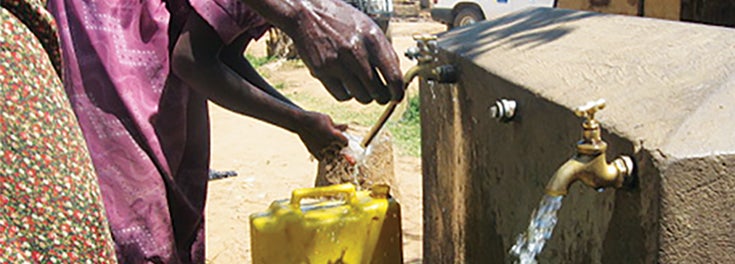
Joseph Dumont spent weeks in Kenya with several other URI students working to help local farmers prepare for drought. Because climate change has made rainfall less predictable in the region, the URI team was there to determine the feasibility of constructing water storage ponds to harvest rainwater for use in irrigating crops.
“We conducted baseline groundwater chemistry tests, investigated soils and clays in the area, and conducted basic topographic surveys and water infiltration tests,” Joseph said. “We got to play diplomat, community educator, scientist and student all in one go.”
From Africa to India to South America, URI students are helping to solve the increasing challenges many communities face in accessing clean water.
The project is one of several that Geosciences Professor Tom Boving and his students are working on around the world to provide clean water to developing nations. With funding from The World Bank, they are also working in India, Jordan and Indonesia to improve water quality in rural villages using a riverbank filtration technology that the professor developed.
“This is the type of solution that is needed in these local communities,” said Professor Boving. “It’s technologically simple, inexpensive compared to conventional water systems, and can be maintained by local operators. And it’s a project that provides my students with tremendous learning opportunities.”
There are plenty of other ways, too, that URI students are helping to solve the increasing challenges many communities face in accessing clean water. Civil Engineering Professor Vinka Craver, for instance, takes students to Guatemala every year to design and build wastewater treatment facilities for rural schools. And this year she and her students are working in Jordan to develop a new desalination process to make ocean water drinkable.
“That trip to Guatemala impacted me a lot personally, to see so many people who lack this basic human right: access to proper sanitation and clean water,” said Maria Briones ’14, who graduated in May. “It was a bit of a culture shock to see their circumstances, but it showed us the reality of why we were there.”
Three new URI professors will provide students with additional perspectives on water: Ali Akanda studies the intersection of water, climate change, and public health, especially in large cities in Asia and Africa; Soni Pradhanang works on water quality issues in Nepal; and Todd Guilfoos looks at water from an economic perspective as an agricultural commodity.
And if you prefer to learn about water right here at home, you could work with the URI Watershed Watch program, monitoring water quality in ponds, lakes and streams throughout Rhode Island. Or with professors studying the health of local watersheds, pollution in Narragansett Bay, the politics of water, or numerous other approaches.
If you’re looking to play a role in important water issues around the globe, URI is a great place to get your feet wet.
